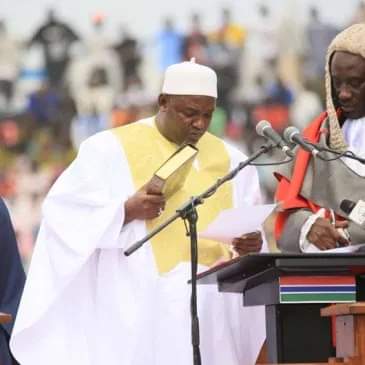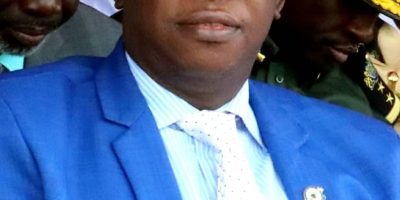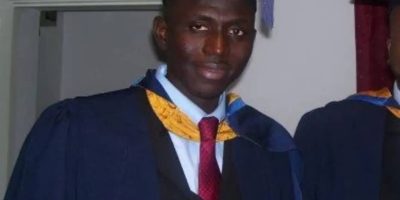By Alagi Yorro Jallow
 Fatoumatta: The times’ wisdom requires paying no homage to shrines or oracles but keeping our Constitution, and its spirit, alive and healthy. Ours, the 1997 Constitution heretofore, must be the courage of conscience, not the vacuous embrace of tribalism or nepotism, or clannism, which only exacerbate the unpitied miseries of hollow nationalism.
Fatoumatta: The times’ wisdom requires paying no homage to shrines or oracles but keeping our Constitution, and its spirit, alive and healthy. Ours, the 1997 Constitution heretofore, must be the courage of conscience, not the vacuous embrace of tribalism or nepotism, or clannism, which only exacerbate the unpitied miseries of hollow nationalism.
President Adama Barrow’s inaction has been faulted over the delay to fill the vacant Independent Electoral Commission (IEC) Post of a Commissioner. A civil society section asks him to fast-track the process. The Commission should be fully constituted because the task ahead is quite tricky. We need five members at the Commission to do the job as mandated by the law, and not four. The IEC Act provides that the Commission shall have five members.
In the interest of good governance on various fronts, it should interest the Gambia Government in filling up the vacant slot and appoint a Commissioner, member vacant at the (IEC) fulfilling the Commission’s five-member committee. Nothing explains why it should remain vacant.
The wine of progressive democracy is drawn from the bottle of a legitimate, fair and veritable, verifiable franchise, served in the glass of the rule of law, and guarded by men and women of uncalibrated wisdom. As a general rule, I keep step to the symphony of accurate and objective law and democracy positioning to secure the vote and protecting Gambian democracy.
Fatoumatta: Let the Independent Electoral Commission (IEC) be the silent, fair, and pure elections manager. The (IEC) was established under section 42 of the 1997 Constitution of the Republic of the Gambia. The Commission operates within the confines of the Electoral Laws in the Constitution.
According to Section 42 of the Constitution, the President shall be acting on the advice and, in consultation with the Judicial Service Commission and the Public Service Commission, appoint the Chairman and four other members of Independent Electoral members Commission (IEC).
Now the Gambia needs to move forward. The IEC must know and forever learn that the rule of law is muscular. Politicians need to realize that their interests and whims are not the heartbeats of this country. Elections need to be appropriately organized and held within a conducive environment.
The growing scourge of electoral despair has to be overcome. Threats and counter-threat have to be abandoned. The Gambia will still have better days in the absence of the leading politicians of the present age. Let them pursue their ambitions and quests with caution.
Fatoumatta: The Independent Electoral Commission (ICE) without full membership of the Commission can reduce the quorum for transacting business at the IEC from five to three. While this may be technically tenable, there is a problem. The total membership of the IEC is five. If three constitute a quorum, it means a minority composition of the IEC could make decisions that bind the majority. In practical terms, with the quorum reduced to three, it means two commissioners could make binding decisions for the IEC when the law provides for five commissioners. Matters get even more interesting without appointing a commissioner to fill the law’s constitutional requirement, which allows a minority of the members present and voting to make binding decisions for the IEC. Whether this is unconstitutional, democratic, or even logical is a debate for another day.
Now, we can read a well-orchestrated plan by some quarters to throw the state into anarchy. Without delay, let the Government of President Adma Barrow appoint one of the IEC vacant position of a commissioner and not leaving the Independent Electoral Commission without a full committee of five commissioners as required by the Constitution without a quorum. That would mean that the country would have no legally constituted body to conduct Presidential and General elections. Thus, the supreme decision is now preserved in our democracy’s history, eternally. Individual opinions are always extravagant and subjective, much of which is not the subject of national interest at the moment. Elections should be held. Life has to go.
Fatoumatta: December 4, 2021, Presidential Election in the Gambia will be a critical, earth-moving, and likely to be an expensive affair. The nation is at a pivotal and authentically historical point. It is a national turning point. As it happens with revolutions, the nation is expected to turn with the times, from the drub cannibal politics and despotic leanings and take a democratic trajectory.
The choices are stark, the stakes are high, and anxieties are on the brink. Candidates for various political parties, Godfathers, Godsons, and political landlords, surrogates are taking positions, and the electorate is being treated to a noisy, confusing, tribal, and blood-letting market place.
Fatoumatta: It is somewhat oxymoronic for the 1997 Constitution to allow the sitting President to have a leading role in the appointment of the Chairman of the Independent Electoral Commission (IEC) to oversee the elections appointing the President. Believe it or not, the said constitutional provision puts unnecessary pressure on the appointing President’s shoulders. How can he please the unrepentant naysayers?
Of course, a few countries where the heads of state play an active role in selecting the Electoral Commission members. However, unlike Gambia’s mode of selection, the legislature would have to confirm the head of the state’s nomination for the appointment to take effect like in other jurisdictions.
While we may view the controversial topic under discussion, the 1997 Constitution has vested the sitting presidents’ powers to appoint the Members of the Independent Electoral Commission (IEC). Until such constitutional provision is reviewed, there are not much Gambians could do as concerned citizens.
On a lighter note, as a dire hard supporter of Manchester United, I will welcome an opportunity for our club CEO, Ed Woodward, to have a greater say in selecting the referees for our crunch and decisive matches against Arsenal, Chelsea, and Liverpool. How wonderful that would be. Moreover, if that were to be the case, I will never fault our opponents for glinting suspicion on their minds over the referee. Would you?
Fatoumatta: Whatever the case, the onus would be on the appointed referee to exhibit maturity and fairness, for all eyes will be on him. Furthermore, by the way, who said that the appointed referee does not have a preference? Suffice it to stress that it only takes a principled and honest individual to resist temptations. I mean an individual who thinks reflectively over the ramifications of dubious officiating, for in the event of a pitch invasion, the referee might not walk out safely from the ensuing confusion.
Well, if we have chosen the path of democracy, we must as well be prepared to swallow the insipid pellets associated with it. So going forward, we may well take a cue from some jurisdictions in the West African sub-region whose methods of selecting our Electoral Commissioners appear more rational and democratic, in my opinion.
In some embryonic democratic jurisdictions like Burkina Faso, five members are selected by the political party with the majority in the National Assembly. The opposition parties select five members, and five members represent civil society organizations; three members represent religious communities, one traditional authority. The remaining one member represents human rights associations.
Moreover, in Togo, five members are selected by the President, and the Government selects ten by the opposition, two by the civil society, and the remaining two members.
In Guinea, ten members are appointed by the ruling political party, ten are nominated by the opposition’s political parties, three by the organizations of civil society, and the administration appoints the remaining two members.
In Benin, one member is nominated by the President of the Republic, nine members are nominated by the National Assembly, taking into account its political configuration, and one member is nominated by and from civil society organizations with at least five years of engagement in the field of governance and democracy.
In Ethiopia, the members of the Board are appointed by the House of Peoples’ Representatives upon the Prime Minister’s recommendations. Before nominating the Board members who fulfill the criteria, the Prime Minister shall ensure that there has been sufficient consultation forum for political organizations that have seats in the House of Peoples’ Representatives to ascertain that the nominees are independent and impartial.
The Chairman and Deputy Chairman of the Board are appointed by the House of Peoples’ Representatives from among the members, upon the Prime Minister’s recommendations.
On the other hand, in the advanced democracies such as the U.S, the Federal Election Commission is composed of the Secretary of the Senate and the Clerk of the House of Representatives or their designees, ex officio and without the right to vote, and six members appointed by the President, by and with the advice and consent of the Senate. No more than three Commission appointed members under this paragraph may be affiliated with the same political party.
Finally, in Australia, the Chairperson and the non-judicial appointee are appointed by the Governor‑General and shall hold office on a part‑time basis. The person appointed as Chairperson shall be a person whose name is included in a list of 3 eligible Judges submitted to the Governor‑General by the Federal Court of Australia’s Chief Justice.
However, I must confess that I am incredibly impressed with Ethiopia and the francophone countries’ methods of selecting the members of their Independent Electoral Commission. Their selection methods appear more judicious and democratic, and I will entreat our National Assembly to take a critical look and act accordingly, reforming the electoral management body.
Fatoumatta: Consequently, public servants in the Gambia held their offices during the pleasure of the President. Further, presidential candidates in a General Election had no sufficient interest in elections’ conduct and supervision. Accordingly, they could not challenge the eligibility of members of the Independent Electoral Commission. The appointment of such Independent Electoral Commission members is the prerogative of the President.
The 1997 Constitution departs from the established norm not just in the Gambia but in most countries with a standard law legal system. The question here is whether the National Assembly should enact a law that permits an ordinary member without a legal or public policy background to be a member of the Independent Electoral Commission to function that the Constitution vests in the Commission’s Chairman.
While there is nothing patently wrong with allowing other professionals to be members of the Independent Electoral Commission (IEC), its constitutional and statutory functions naturally point to the need to have a sober legal mind heading the Independent Electoral Commission (IEC). As part of the institutional reforms and reforming the Independent Electoral Commission (IEC), an Amendment should include the IEC chairman’s proposed requirement to be a qualified lawyer to be a Supreme Court Judge.
Fatoumatta: There is no point in delving into subsidiary legislation. It is a primary/elementary principle of law, known to every first-year law student, that subsidiary legislation cannot permit that which the parent statute does not permit. The legal maxim for any such subsidiary legislation is called ultra vires. Now, in constitutional/administrative law, anything that is ultra vires is also invalid, null, and void. There is a principle in constitutional/administrative law called delegatus nonprotest delegate or something like that. In ordinary parlance, it means one on whom a constitutional or statutory function is conferred cannot delegate that function unless the Constitution or statute expressly permits him to delegate it.
Fatoumatta: However, due to the nature of all segments of society, intuitively and in the interest of good governance on various fronts, it should interest President in filling up the vacant slots of commissioner at the Independent Electoral Commission (IEC) without delay since the Gambia is heading to an election. Nothing explains why those slots remain vacant.




Ma sha Allah great and thanks for sharing